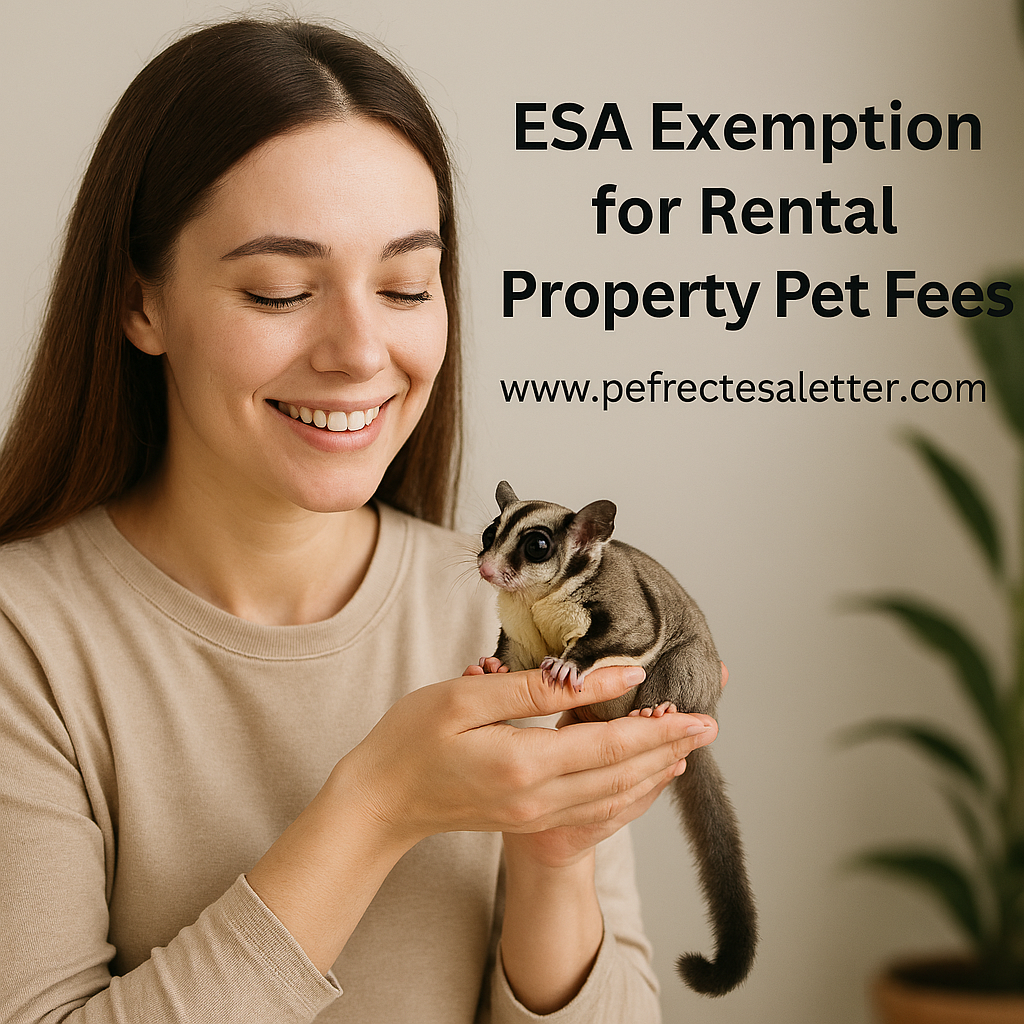ESA Exemption for Rental Property Pet Fees: Your Rights as a Tenant
ESA Exemption for Rental Property Pet Fees: Your Rights as a Tenant
Introduction
Many tenants with emotional support animals (ESAs) face additional costs in rental housing, often in the form of pet fees, deposits, or monthly charges. However, under the Fair Housing Act (FHA), ESAs are legally exempt from such pet-related fees.
Understanding your rights and properly requesting the exemption can save tenants significant money while ensuring compliance with federal law. This guide explains how ESA exemptions for rental property pet fees work, how to request them, and what landlords can legally require.
”Get Yours Now!
Don’t wait until a landlord or airline tells you “no pets allowed.” Protect your rights today.
Please fill out this form and our team wil contact you ASAP.
Complete your assessment in minutes , get approved by a licensed professional, and receive your letter within 24 hours.
What Is an ESA Fee Exemption?
An ESA fee exemption allows tenants to waive typical pet charges in rental properties. These fees may include:
- Pet deposits
- Monthly pet rent
- Pet application fees
- Pet cleaning fees
Unlike pets, ESAs are considered a reasonable accommodation for a disability. Therefore, landlords cannot charge additional fees for ESAs.
Legal Basis for ESA Fee Exemption
The Fair Housing Act (FHA) prohibits housing discrimination based on disability. Emotional support animals are recognized as disability accommodations, giving tenants the right to request exemptions for pet fees.
Key Points:
- Landlords cannot enforce “no pet” policies against tenants with valid ESA documentation.
- ESAs are not pets under the law, so additional fees are illegal.
- Tenants are responsible for any damage caused by the ESA but cannot be charged preemptively like a standard pet deposit.
How to Request an ESA Fee Exemption
Step 1: Obtain a Valid ESA Letter
- Must be issued by a licensed mental health professional (LMHP).
- Confirms the tenant has a disability and requires an ESA for emotional support.
Step 2: Write a Formal Request
- Address your request to the landlord or property manager.
- Attach your ESA letter.
- Clearly state that the ESA is exempt from pet fees under the FHA.
Sample Request Letter:
Subject: ESA Pet Fee Exemption Request – [Your Name / Property Address]
Dear [Landlord Name],
I am submitting a formal request for a reasonable accommodation under the Fair Housing Act for my emotional support animal, [ESA Name]. Attached is a valid ESA letter from my licensed mental health professional confirming my need.
I kindly request that all pet-related fees, deposits, or charges be waived, as ESAs are exempt under federal law. I am committed to ensuring the ESA does not cause damage and will comply with standard property care guidelines.
Thank you for your prompt consideration.
Sincerely,
[Your Name]
[Contact Information]
Common Misunderstandings About ESA Fee Exemption
- “Landlords can still charge a deposit.”
❌ False. ESAs are exempt from deposits, though tenants are liable for actual damages. - “Only small or certain types of animals qualify.”
❌ False. ESA rules apply regardless of breed, size, or type of animal. - “Landlords can request full medical records.”
❌ False. Only a valid ESA letter is needed to confirm the accommodation.
Landlord Responsibilities
Landlords must:
- Approve ESA accommodations without charging fees
- Maintain fair and consistent housing policies
- Accept valid ESA letters from licensed professionals
- Avoid discriminatory practices or retaliation
Landlords can require tenants to pay for actual damages caused by the ESA, but cannot impose general pet fees upfront.
Tips for a Successful ESA Fee Exemption Request
- Provide Documentation Early
Submit your ESA letter at the time of application to prevent delays. - Be Clear and Professional
Politely reference FHA protections when requesting exemption. - Use a Lease Addendum
A signed addendum clarifies responsibilities and protects both tenant and landlord. - Keep Records
Save copies of emails, letters, and ESA documentation in case of disputes.
Case Example
Scenario:
Michael applied for an apartment in Dallas. The property charged a $300 pet deposit.
Action:
Michael submitted a valid ESA letter and requested a fee exemption citing FHA protections.
Outcome:
The landlord approved the accommodation, waived all fees, and drafted an ESA addendum confirming responsibilities. Michael moved in successfully with his ESA.
Conclusion
Tenants with emotional support animals have a legal right to ESA fee exemptions in rental properties. By obtaining a valid ESA letter, submitting a formal request, and maintaining professional communication with property management, tenants can ensure compliance with federal law while avoiding unnecessary fees.
Remember:
- ESA = Disability accommodation
- Fees = Not allowed, but damages = Tenant responsibility
- Documentation = Key to smooth approval
Proper understanding of your rights protects both the ESA owner and the landlord while fostering a fair and compliant housing environment.
”Get Yours Now!
Don’t wait until a landlord or airline tells you “no pets allowed.” Protect your rights today.
Please fill out this form and our team wil contact you ASAP.
Complete your assessment in minutes , get approved by a licensed professional, and receive your letter within 24 hours.

